We always have a bottle of cold and flu cordial around the house. Anytime someone feels something coming on, they take a shot, and the cold never comes! Learn how to make this elderberry cordial recipe, and you will have a delicious herbal drink to prevent sickness. I make lots of elderberry cordial every year, and there is always someone who needs it.
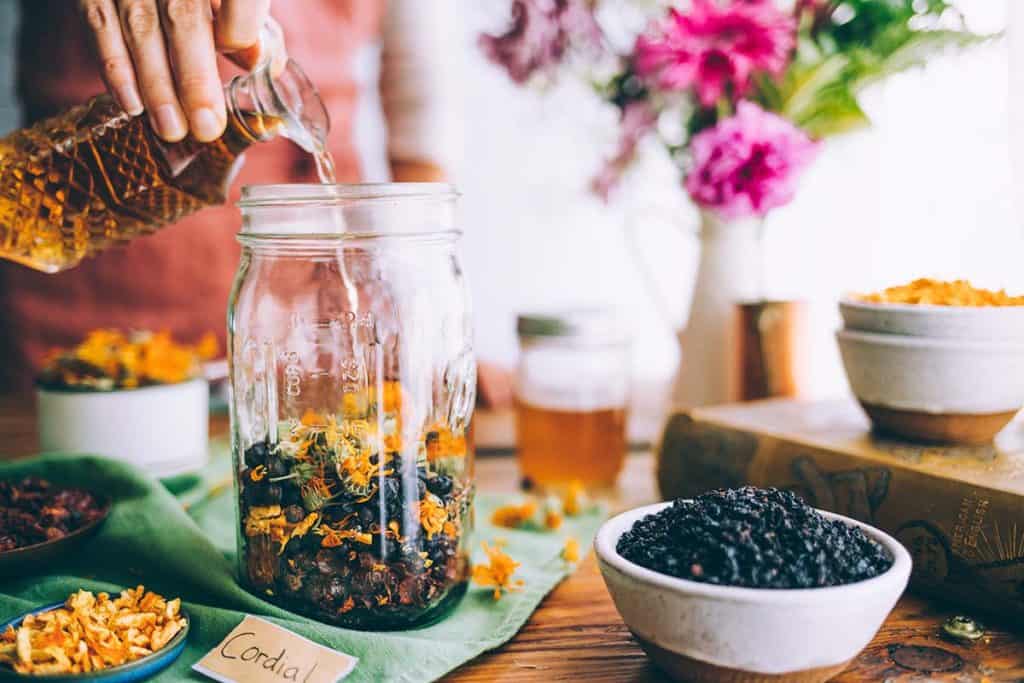
What Is an Herbal Cordial?
Herbal cordials are alcoholic drinks made with fresh and dried herbs and fruit. They have a variety of uses and are often sipped before or after dinner as digestive tonics.
Cordials are high in alcohol content and are meant to be sipped in small quantities. A typical cordial glass is 1/2 to 1 ounce in size. Drinking a lot of cordial isn’t that good for you, but a little sip before or after dinner can be very beneficial. Especially in the winter, there is almost always a little cordial on our table.
Besides sipping them straight, cordials are generous cooking companions and you can add them to cakes, desserts, marinades, fresh fruit, jams, pie fillings, and more. The first cordials I made were for sipping in the winter to prevent sickness. I left some of the cordials out in my cooking area and just thought, hey, this orange ginger cordial would probably go well in a chicken marinade. Pretty soon, cordials were sneaking their way toward being a staple part of my cooking.
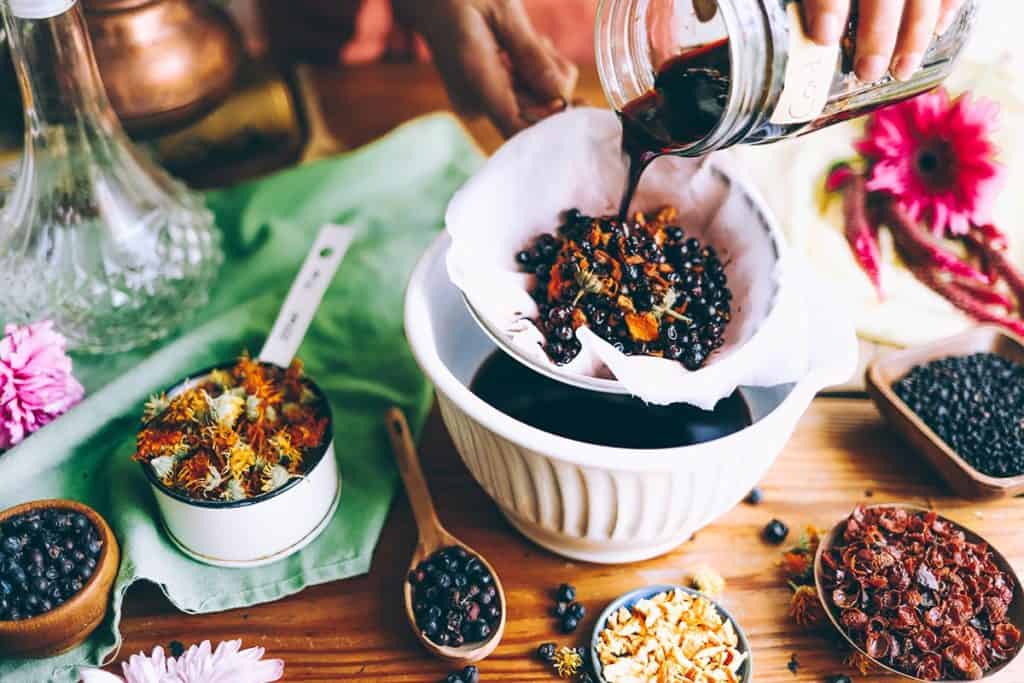
Elderberry Cordial Recipe
Elderberry cordial is first on the list to subdue cold and flu symptoms. I can’t even tell you how many colds have started and then not progressed due to the aid of elderberry cordial. I give bottles of my elderberry cordial recipe away to students, family, and friends, and anytime someone feels a cold or flu coming on, the cordial starts flowing. If you drink a shot at the very onset of cold symptoms, it can really keep the cold from progressing into a full-blown sickness.
This elderberry cordial recipe comes from my book, The Herbal Kitchen. Let’s take a closer look at what’s in our recipe…
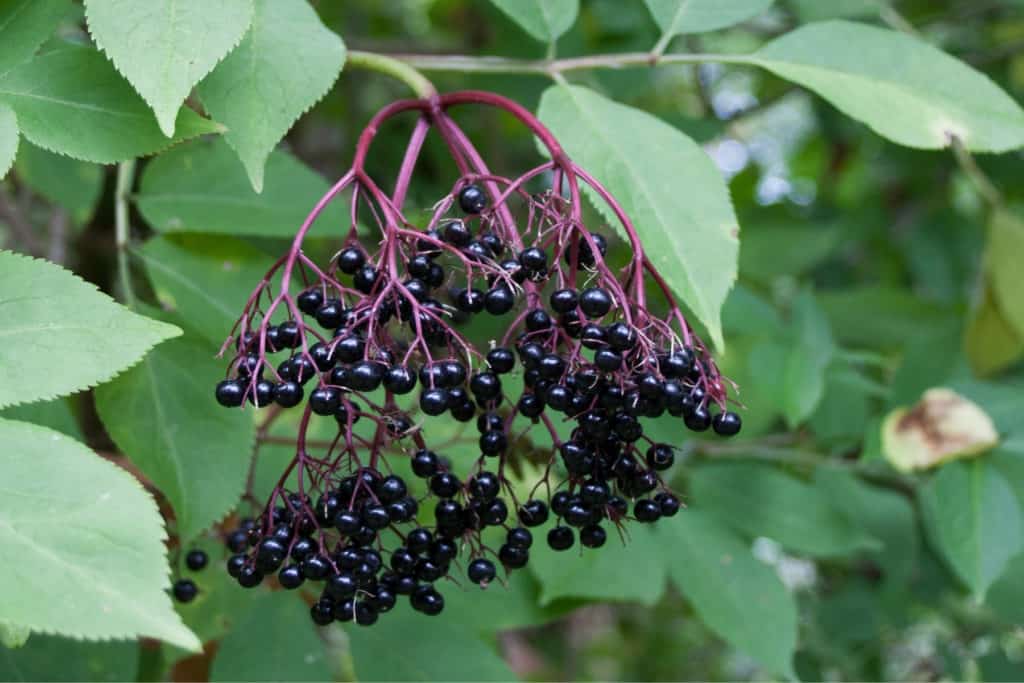
Elderberry
Blue and black elderberry (Sambucus mexicana and nigra) enhances the immune system, and its antiviral properties inhibit flu virus from penetrating cell membranes. These highly medicinal elderberries are rich in vitamins A and C and are loaded with flavonoids that are tonic to the cardiovascular system. Elderberry cordial, tea, or honey can be used to prevent respiratory viral infections.
Elderberry remedies like this elderberry cordial recipe work best for you if taken at the very onset of symptoms, before the virus takes hold. Don’t wait until you know you are sick. At the first sign of a tickle in the throat, a drop in energy, burning eyes, achy muscles, or any other pre-flu symptoms, think of elderberry.
You can purchase elderberries at Mountain Rose Herbs.
Elderberry is also relatively easy to grow. Click here to get your free How to Grow Elderberry Tutorial.
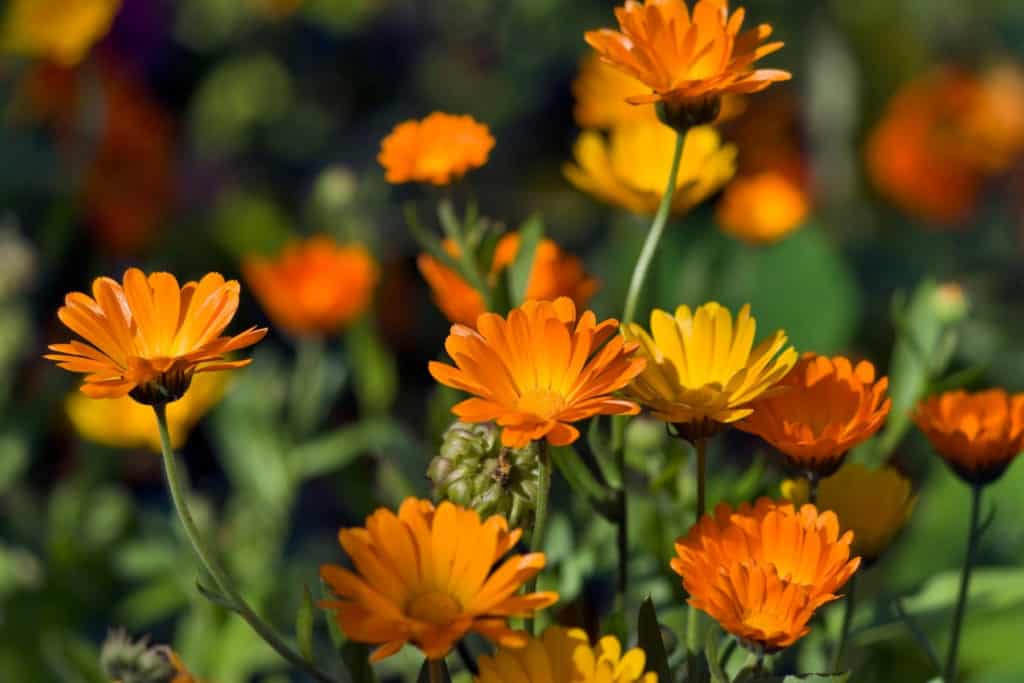
Calendula
Besides being a first-rate skin healer, calendula (Calendula officinalis) also encourages the healthy flow of lymph throughout the body. The lymph system supplies oxygen and nutrients to cells and tissue. It distributes immunity and forms a network throughout the body that removes waste and pathogens. Stagnant lymph sets the stage for a profusion of ailments. Keep your lymph moving with exercise, stretching, and calendula flowers.
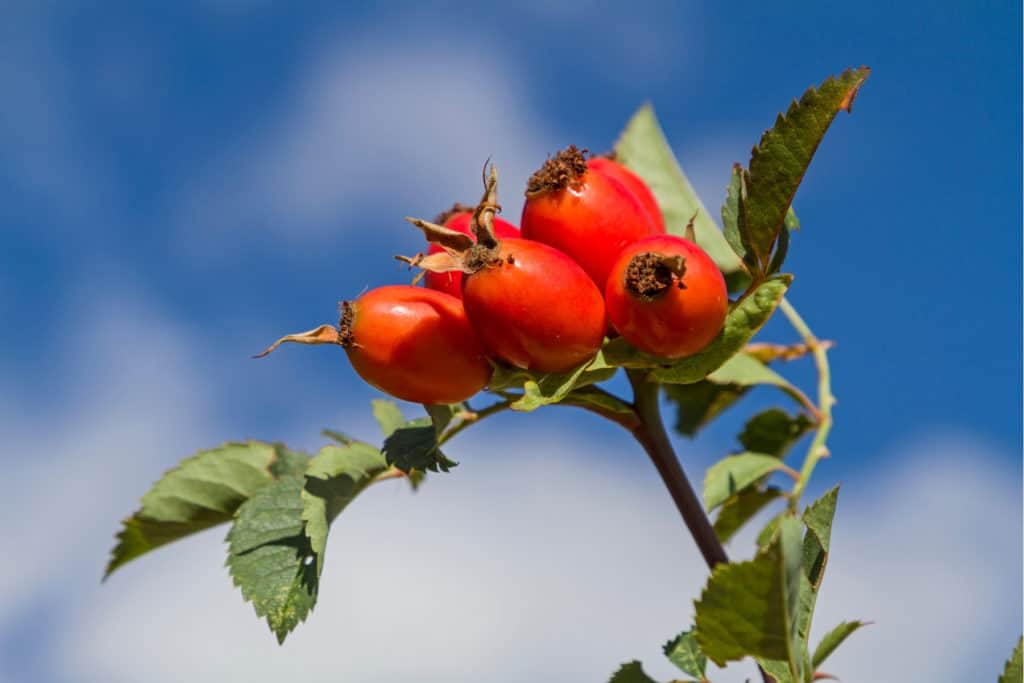
Rose Hip
Rose hips (Rosa spp.) are recognized as one of the highest plant sources of vitamin C and have historically been used to treat scurvy. They are loaded with vitamins and minerals, and their carminative properties aid in the absorption of nutrients.
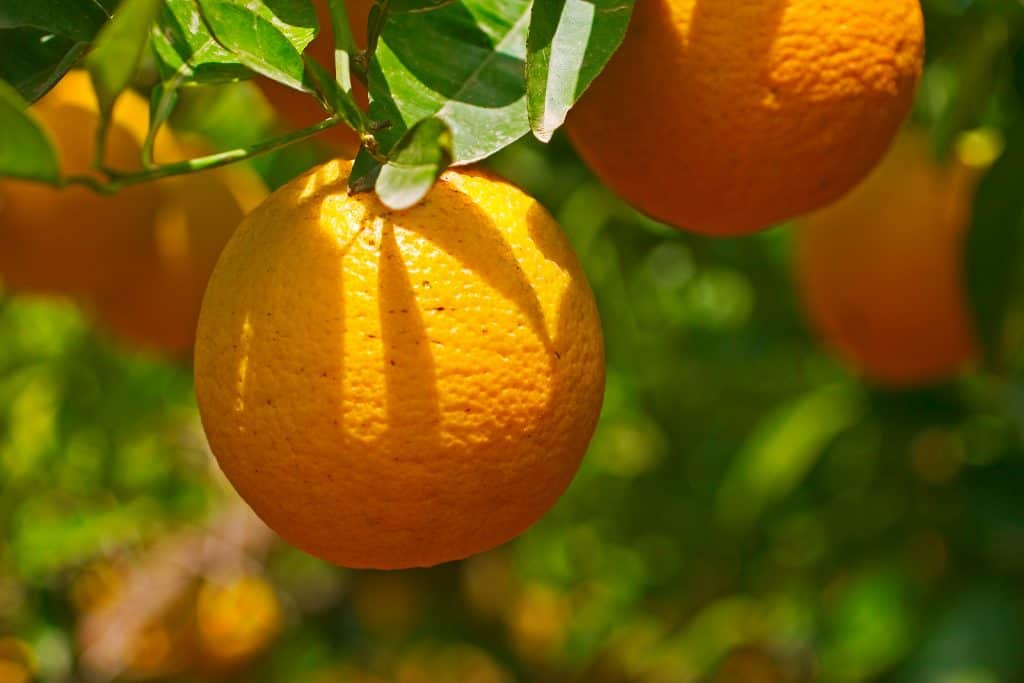
Orange Peel
Orange peel (Citrus sinensis) chases away mucus and wards off colds and flu with its antibacterial and antiviral properties. What a shame that most people throw away this beneficial part of the fruit! It’s easy to dry your own orange peels to use in this elderberry cordial recipe as well as teas and cooking.
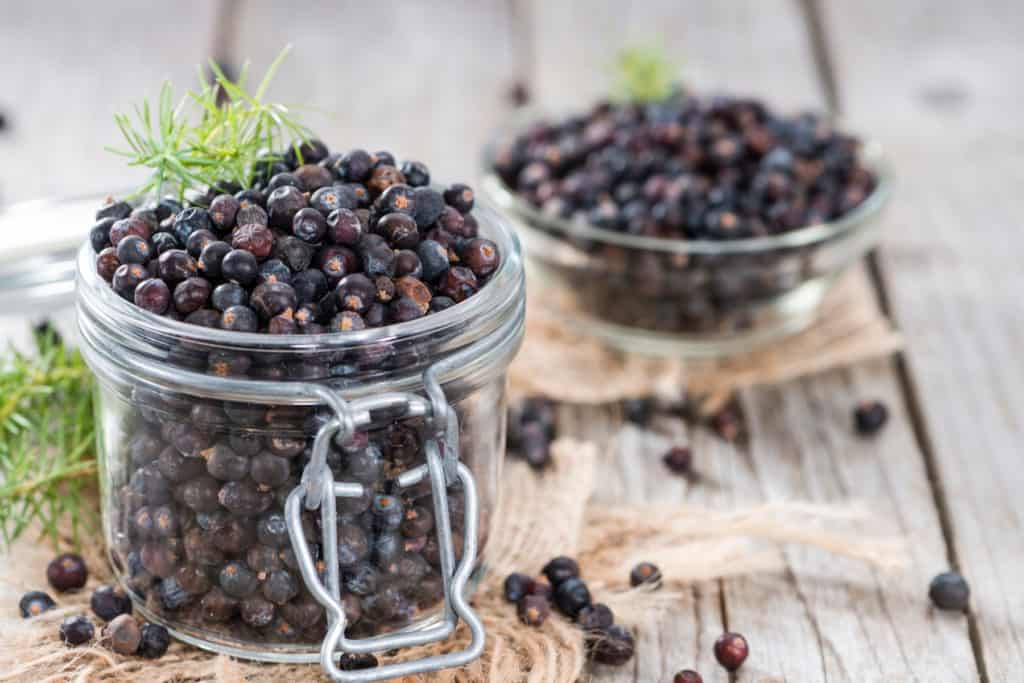
Juniper Berry
Juniper berries (Juniperus communis) can relieve a sore throat and enhance circulation and lymph drainage. Herbs that help improve circulation are beneficial allies as they increase the surface area that the blood can deliver nutrients and eliminate waste from. I love the the combination of elderberries and juniper, as you can also see in my recipe for Elderberry Juniper Syrup for the Masses.
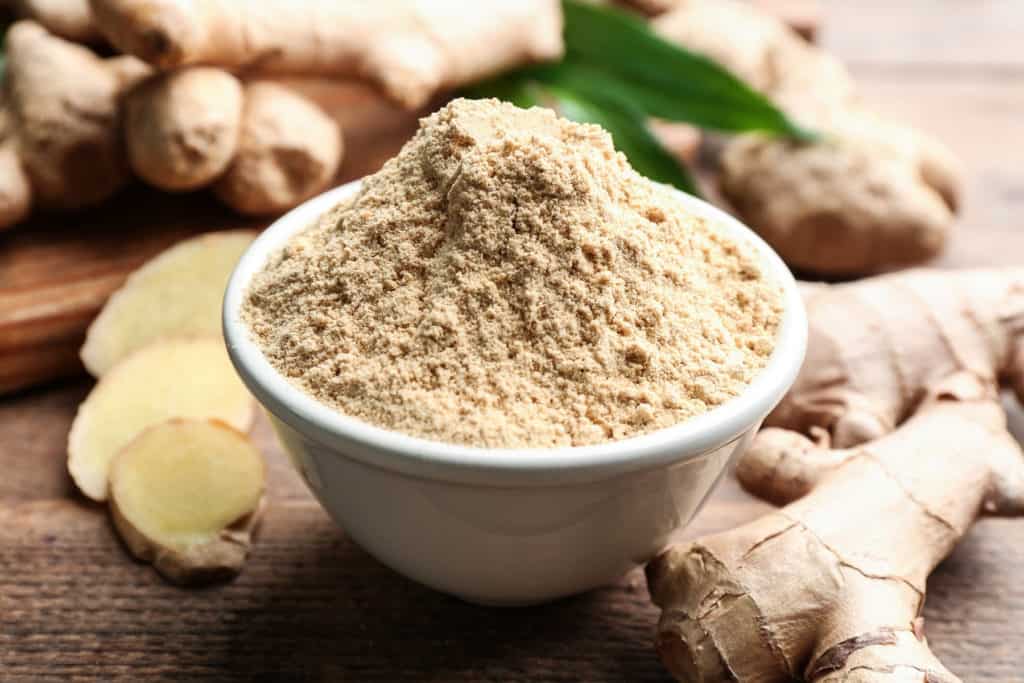
Ginger
Ginger (Zingiber officinale) warms our teas, honeys, and cordials all winter long. A classic cold buster, ginger helps with colds, flu, and coughs. It increases circulation, gets rid of mucus congestion, relieves aches and pains, reduces inflammation, and more.
Ready to seriously herbify your kitchen pantry? Check out My Herbal Kitchen
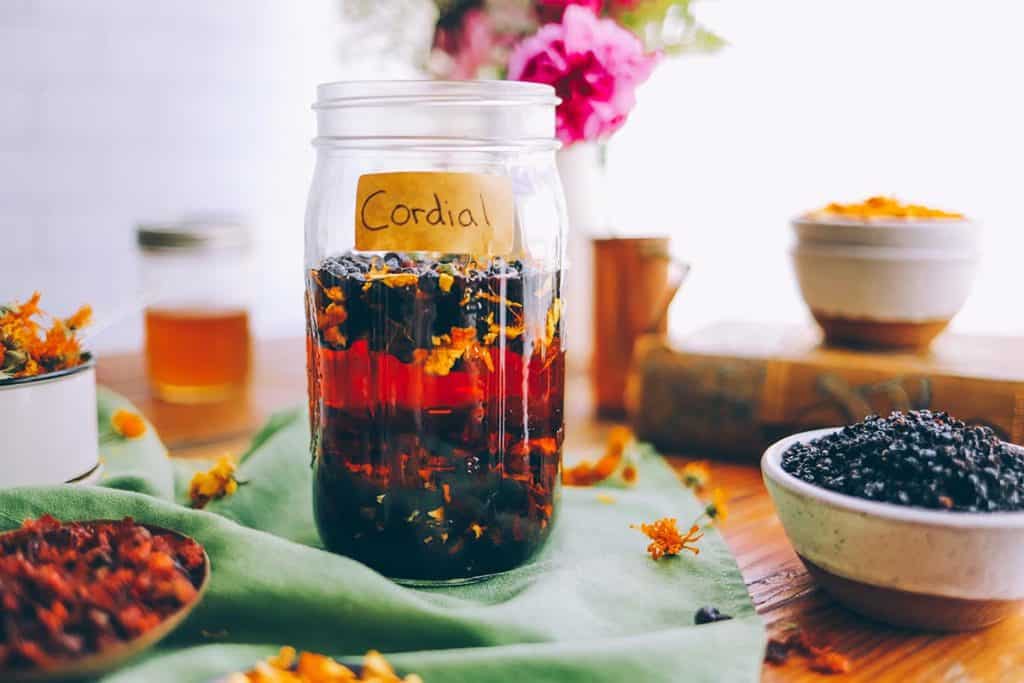
No More Colds Cordial
Ingredients
- 1 cup chopped fresh calendula or 2/3 cup dried calendula
- 1 cup whole fresh elderberries or 2/3 cup dried whole elderberries
- 1/2 cup chopped fresh rose hips or 1/3 cup dried rose hips
- 2 tbsp finely chopped fresh orange peel or 4 teaspoons dried orange peel
- 1 tbsp whole dried juniper berry
- 1 tbsp minced fresh ginger or 1 tsp powdered ginger
- 4 cups brandy or to cover by 2 inches
- Black cherry concentrate or honey to sweeten
Instructions
- Fill a clean mason jar with the herbs and fruit.
- Pour the brandy over the herbs and fruit, filling the jar to the top.
- Put a lid on the jar and label the jar with the date and contents.
- Store it in a dark place for 1 month. Make sure your fruit and herbs stay covered with brandy by about 2 inches. Occasionally check to see if you need to add more brandy, as some of it may have been soaked up by the plant material.
- Place a funnel into the mouth of a clean, sterilized jar and lay muslin on top of the funnel.
- Carefully pour the brandy through the muslin and funnel. Allow all the liquid to strain through the cloth into the jar. If you are using dried fruit, squeeze the rest of the liquid out of the dried plant material through the cloth into the jar. If you are using fresh fruit, do not squeeze, or you will end up with a cloudy extract.
- Discard the herbs and fruit. Add it to your compost or just put it on the dirt in your garden.
- Sweeten the liquid to taste with black cherry concentrate or honey. Traditionally, one-half part sweetener is added. Pour the liquid into a measuring cup to see how much you have. Divide that number in half, and that is the measurement for your sweetener. However, this is just a suggestion; adjust things to your taste.
- Cordials made with fresh fruit will last about 1 year, while cordials made with dried fruit will last a couple of years.
I would love to hear from you! What are your favorite herbal remedies to prevent sickness? Have you ever made an herbal cordial? Please share in the comments below!
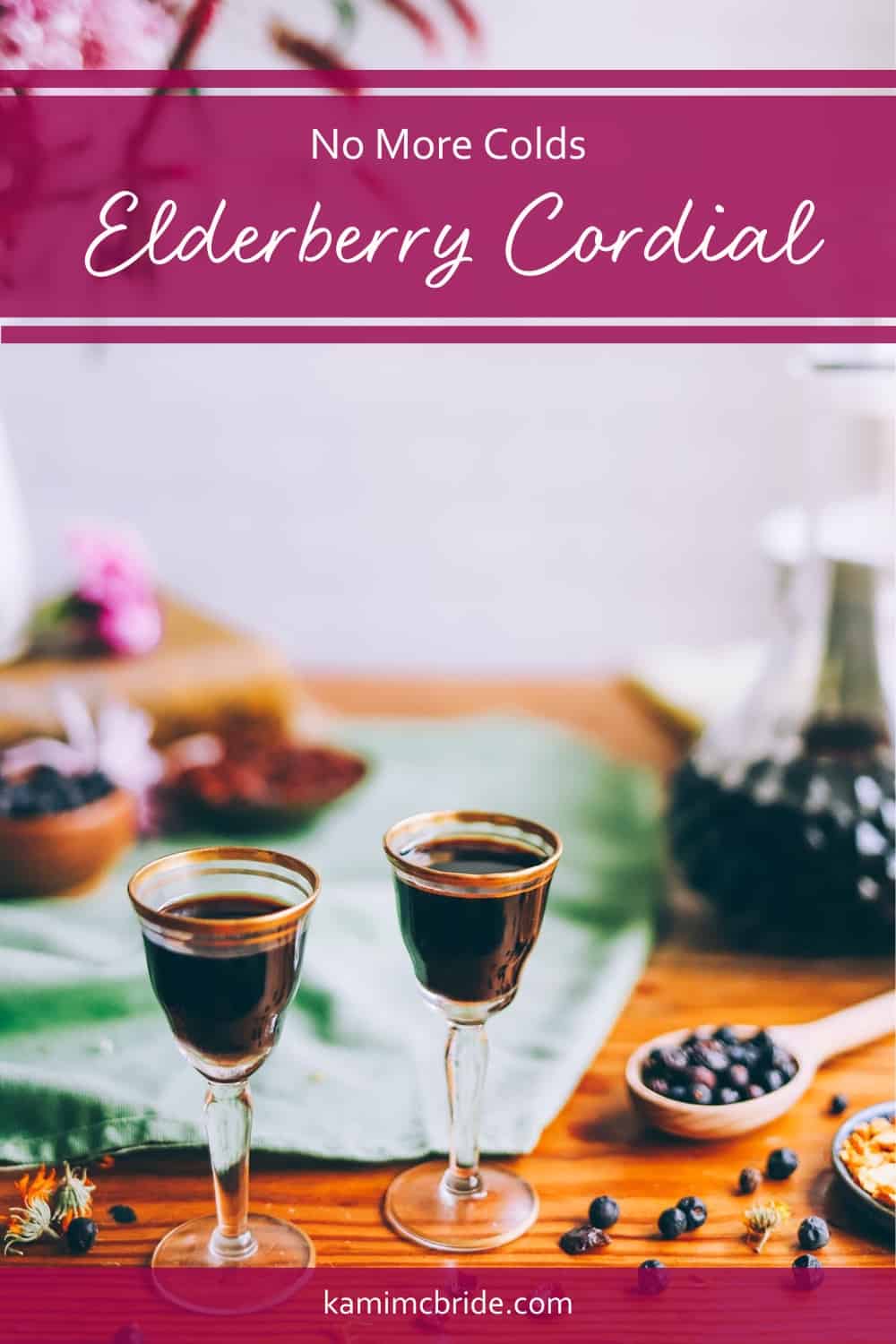

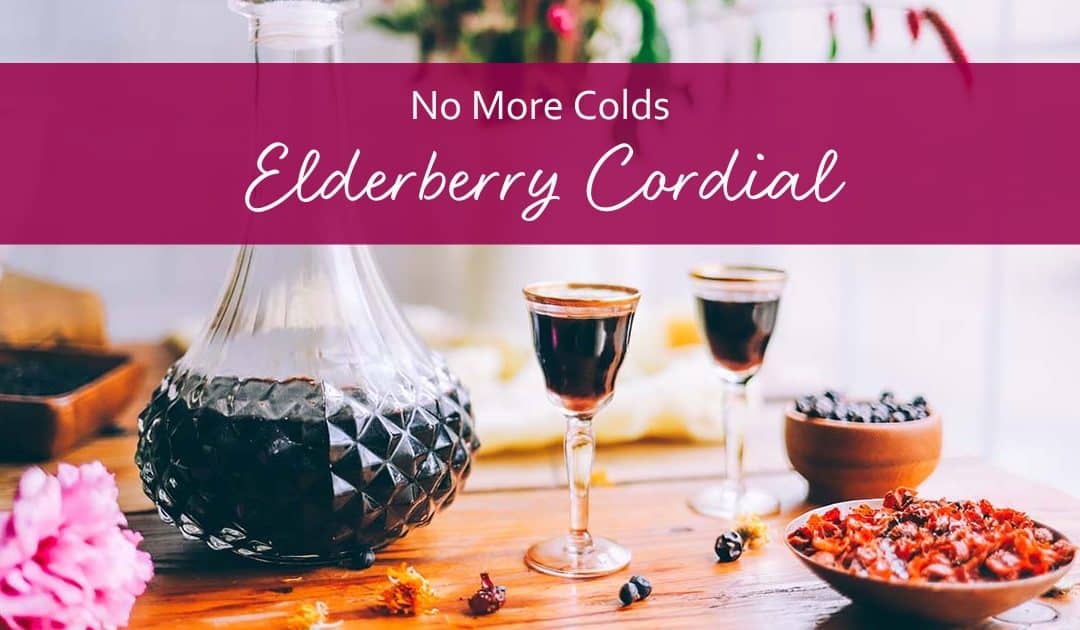
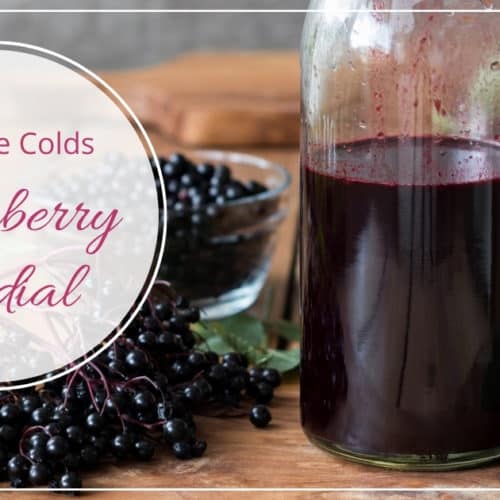
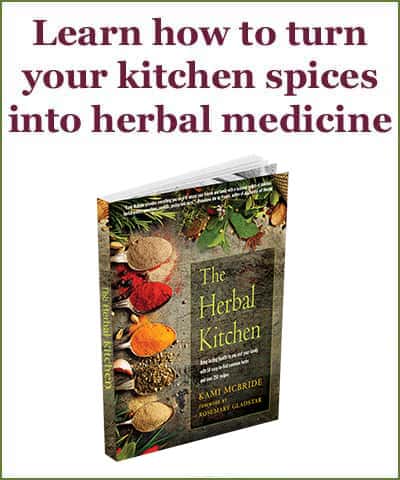


Is the calendula just the petals or the flower heads?
whole flower heads
Looks great! I have everything except the rosehips. Is there a good substitute? Or can I leave them out?
All of my recipes are meant to be played with, go ahead and experiment!
I made me a jar and let me tell you it’s soooo good, I also made a jar with blackberries and blueberries….love it! Need to make more for gifts
I bought a bag of frozen elderberries. Can I dehydrate them in a dehydrator? If so how long would I dehydrate them without over doing it? Would love to make this recipe with dried elderberries.
You can use them frozen (use 1 cup)
Thank you for this recipe. You state that this will last for about a year (or 2 if using dried fruit). Should the final product be refrigerated? Thanks so much for sharing your wisdom.
No refrigeration needed as the brandy preserves it.
I’m really excited to try this, as I have not tried a cordial but am not wanting to use any over-the-counter flu or cold medicines. yuck. I appreciate every bit of knowledge I have gleaned from your classes and blog.
I’ve not made elderberry cordial, only syrup. But somewhere I got the idea (maybe Richo Cech?) that elderberry needed to be cooked. Now, I’m wondering, if I cooked the elderberries and herbs (I love the idea of adding juniper berries), and reduced that way down, then added the sweetener and brandy, would it still be considered a cordial?
The process you are describing is making a syrup. Making a syrup this way is a also a good way to take elderberry
Is it okay to use a mix of dried and fresh herbs in this recipe? I am also wondering about giving to children. Would a half ounce work for them?
Yes, you may use a mix of dried and fresh herbs, just note the different amounts for each.
I looked and looked and could not find the recipe for the elderberry cordial. I cannot see a link in the article either. Am I missing something?
Hi, the recipe is right above the comments, no link…it’s just right in the article.
I am curious how much you take of this cordial. Just a sip? Half a cup? I want to make this and use it, but not familiar with cordials as medicine. Thank you! I have your book The Herbal Kitchen, and while I haven’t made many recipes yet, you have inspired me to add herbs to my food. I don’t know a meal I cook that doesn’t have some herb or other, or several, added to it! I am grateful you are willing to share your knowledge 🙂
A sip or two is good. Cordial glasses typically hold half an ounce to one ounce.
What a wonderful recipe, thank you! I am learning a lot from your page. (bow)
So glad you are enjoying it